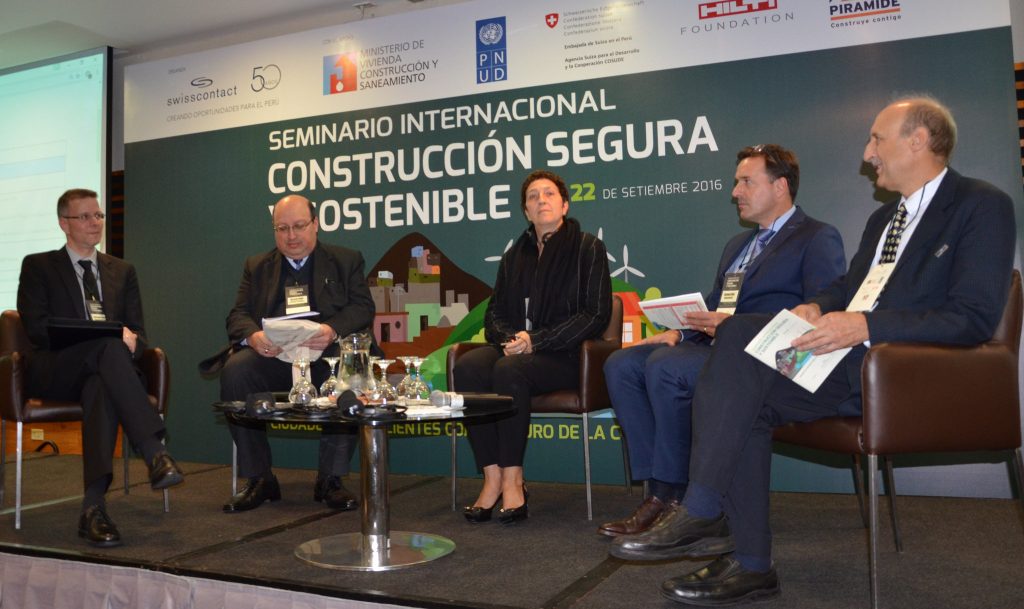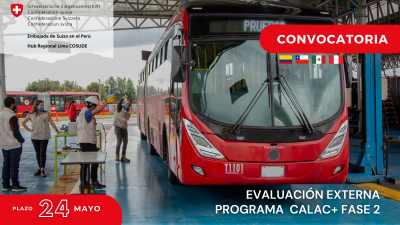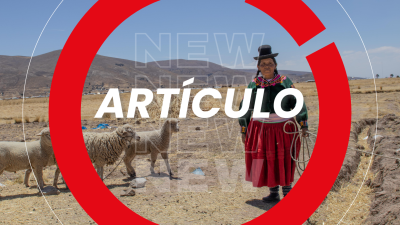International Seminar on Safe and Sustainable Construction
Considering that housing demand in the country will grow to 2 million formal houses in less than 10 years, Swisscontact promoted the International Seminar that gathered more than150 public officials, entrepreneurs, professionals and academia involved in the construction and environmental sectors. The event took place in Lima, on September 21 and 22.
The Seminar had the support of the Ministry of Housing, Construction and Sanitation of Peru, the United Nations Development Program (UNDP) the HILTI Foundation and the Swiss Cooperation SDC, within the framework of its Global Program on Climate Change and the sponsorship of Ladrillos Pirámide. In this respect, the event sought to promote the construction of safe and sustainable houses in urban peripheral areas, sharing successful experiences and good practices in both construction processes towards reducing the vulnerability of houses and in construction using materials produced with eco-efficient technologies, establishing trends keeping in mind the challenges that cities will have to face in the future.
While it is one of the key sectors in economic development in the country, construction ranks first in electric power consumption. Globally, it is responsible for 21% of water consumption and 65% of waste, and it is associated to 40% of Greenhouse Gas (GHG) emissions. In addition, construction has a high informality rate in Peru: 60% of the houses are self-constructed, half of them lack blueprints. Currently, 8 million people live in housing conditions that present safety and health risk and 85% of Peruvians believe their house would not withstand an earthquake of great magnitude.
The first day of the Seminar presented the panel “Practices for earthquake-resistant confined masonry construction”, within the framework of the Block “Safe Construction in Cities with High Vulnerability”. The panel was moderated by Philippe Schneuwly, Swisscontact Central America, who shared the stage with: Diego Triana, responsible for the Program Construrama, CEMEX; Martin Jaggi, Director of Swiss Cooperation COSUDE; María del Carmen Delgado, Head of the Construye Project, Swisscontact; Ricardo Zúñiga, SIKA; Gabriela Esparza, Research and Standardization Manager of SENCICO; Felipe García, Director of CAPECO; and Raúl Berríos, Manager of Ladrillos Pirámide.
Below is a brief account of the panel and highlights of each presentation.

Triana shared the experience developed in technical training programs by CEMEX, who, in addition, promotes technical work among bricklayers and constructors, thus strengthening competencies of one of the key actors in the construction chain, as he pointed out.
Thereafter, Berríos underscored that “80% of sales are concentrated in the informal construction sector. Informality is not only in the construction system, but also in the material or input used to build in order to have a safe house. Responsibility starts with the manufacturer” and added: “We have started activities that go hand in hand with knowledge, some training workshops, but support is required from other institutions and stakeholders involved in the sector, as well as related policies that are generated that set the path of construction and growth of the city”.
In turn, Ricardo Zúñiga, representative of SIKA, indicated that they are working side by side with innovation and stated that “brick, concrete and iron are the three key elements of construction; we have revolutionized that, using a sika additive to replace water. We are educating, disseminating knowledge to teach the market that the vulnerable structures we have in our country are the responsibility of the manufacturer. It is not impossible to have a safe and healthy house in our country. By disseminating knowledge we inform them that there are products that will help them have a better quality of life”.
Felipe García pointed out that: “knowledge is the key. The best construction material will fail if there is no training. We are committed to training, to achieve that people learn to build. We have developed professional training at professional operating and technical level to educate”, “we are undertaking, offering virtual courses to reach people massively and in some subjects, free of charge, to disseminate knowledge”.
Gabriela Esparza from SENCICO, commented that “our concern during the past three years has been prevention to face earthquakes. We have worked out a seismic dangers service, available at our website for the public in general and at no cost. This is pioneering in Latin America; it contributes to earthquake-resistant construction designs. We have also conducted studies with the support of Swisscontact, that confirm that informal constructions are vulnerable in the event of earthquakes”.
In this respect, Martin Jaggi shared the work being conducted by the Swiss Cooperation with respect to prevention and in the aftermath of a seismic disaster, through its Humanitarian Aid Program. “In the face of a disaster, the Swiss Cooperation works not only in rapid response and rehabilitation, but also in disaster prevention issues, strengthening institutions’ capacities regarding contingency and evacuation plans. We consider that political dialogue is key towards accelerating and pushing for a better situation and reaction in the countries where we operate”. He added that “it is a never-ending work, it is necessary to improve until a very high resilience level is reached and it is essential to work hand in hand with the private and the public sector, as well as with the civil society”.
Finally, Ma. Del Carmen Delgado from the Construye Project of Swisscontact indicated that “we have detected the need to conduct research studies on the most frequent bad construction practices and identify what training corresponds to each of them; to this end we are working alongside the private and public sectors. We consider it is very important to work directly with the construction foremen and we enter into strategic alliances with the manufacturers according to the topics (bricks, additives, etc.) as well as with educational entities such as SENCICO… articulating efforts will help us cover more and move forward in this sector”, she pointed out.
Once the panel finished, the moderator commented that it is important and necessary to implement public policies that may contribute towards safe and sustainable construction, from some very complex ones, to other very creative ones that may be worked out with children throughout their education. It is worth admitting that the private sector, by itself, will not be able to contribute the solution; it is an articulated work that involves all sectors.
Swiss Cooperation COSUDE, has been contributing since 2009, offering technical and financial support for the implementation of the Energy Efficiency Program in Latin American Brick Factories to mitigate Climate Change (EELA) in 7 countries of the region and it seeks to promote the reduction of Greenhouse Gas (GHG) emissions in artisanal brickworks by implementing comprehensive energy efficiency models based on learning generated by the exchange between countries and through incidence on national public policies. At this date, the results obtained show, for example, that in Brazil and Colombia, informality in the brick manufacturing sector has been notably reduced and use of technology has increased significantly; and that in Peru, Ecuador, Bolivia and Mexico adaptation to new, improved technologies has started.
 |
| view pictures |
Web International Seminar on Safe and Sustainable Construction
News, Perú Construye
News, Portal Constructivo
Relevant links.
EELA Program, Project sheet, Swiss Embassy, Swiss Agency for Development and Cooperation SDC








